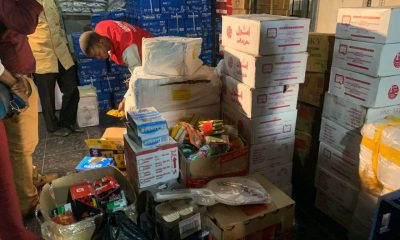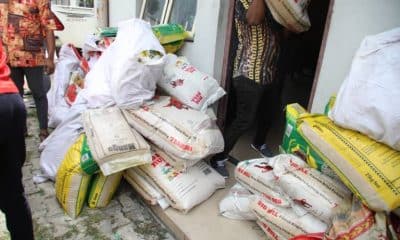Nigeria News
NAFDAC Launches Initiative To Combat Drug Abuse In Schools

The National Agency for Food and Drug Administration and Control (NAFDAC) has introduced the “Catch Them Young” initiative, aimed at addressing the rising issue of drug abuse among Nigeria’s youth, particularly targeting secondary school students.
The programme was officially launched at Government Secondary School, Tudun Wada, Wuse Zone 4, Abuja, with NAFDAC Director General, Prof. Mojisola Adeyeye, stressing the significance of the campaign.
In her keynote address, Prof. Adeyeye stated, “The ‘NAFDAC-Catch them Young’ programme focuses on drug abuse education and awareness, especially targeting the youth, who are the most affected by this crisis.”
She highlighted worrying statistics, revealing that “14.4 per cent or 14.3 million Nigerians are impacted by drug abuse,” and underscored the need for the programme.
Adeyeye further explained that this initiative is part of NAFDAC’s larger strategy to collaborate with key stakeholders in reducing the demand for drugs.
She also cited alarming data showing that one in four high-risk drug users in Nigeria has been arrested for drug-related crimes, which range from possession (73 per cent) to theft (12 per cent), sex work (5 per cent), burglary (4 per cent), and shoplifting (2 per cent).
“These statistics only reflect arrests, but many crimes go unreported, meaning the problem is likely worse than these figures suggest,” she cautioned.
The “Catch Them Young” programme seeks to educate students on the dangers of both legal and illegal drugs, with a particular focus on preventing addiction.
“Drug addiction can arise from both legal, prescribed medicines and illicit drugs,” Adeyeye noted, adding that the programme aims to have honest conversations with students rather than scare them.
Adeyeye also discussed the broader societal consequences of drug abuse, mentioning that “Two-thirds of people who abuse drugs report serious problems, such as missing school or work, poor performance, and even neglect of their families.”
She further cautioned students about the easy access to commonly abused substances, such as alcohol, tramadol, and prescription medications, which are often available without proper oversight.
She explained, “Many young people turn to online sources for substances that claim to enhance athletic performance or aid in weight loss, but these can lead to dangerous habits and more serious drug use.”
Adeyeye also warned that experimenting with harder substances like cocaine or methamphetamine can have devastating effects on one’s health and future.
NAFDAC’s initiative is also designed to shed light on the dangers of drug abuse, including impaired judgment, risky behavior, mental health issues, impaired driving, and declining school performance.
“Substance abuse often results in lower grades due to poor attendance,” Adeyeye remarked.
She added that drug addiction can lead to severe health issues, including damage to vital organs such as the heart, lungs, liver, and kidneys, as well as memory and learning impairments.
She urged students to avoid peer pressure, seek help when needed, and prioritize their education.
A key element of the programme is the involvement of teachers in the fight against drug abuse.
“Our teachers spend a considerable amount of time with students, and they have a critical role to play in identifying behavioral changes and working with parents to address them,” she said.
Teachers were encouraged to foster a supportive and non-judgmental environment for students who may be grappling with drug-related issues, providing guidance and seeking help when necessary.
In addition, NAFDAC aims to expand its Consumer Safety Club in secondary schools as part of a broader effort to combat counterfeit drugs and promote drug safety.
“We deem it expedient to immunize our society by re-orientating our youths through the activities of the NCSC,” Adeyeye stated.
She also encouraged students to “be agents of change” by making responsible decisions and avoiding the dangers associated with drug abuse.










